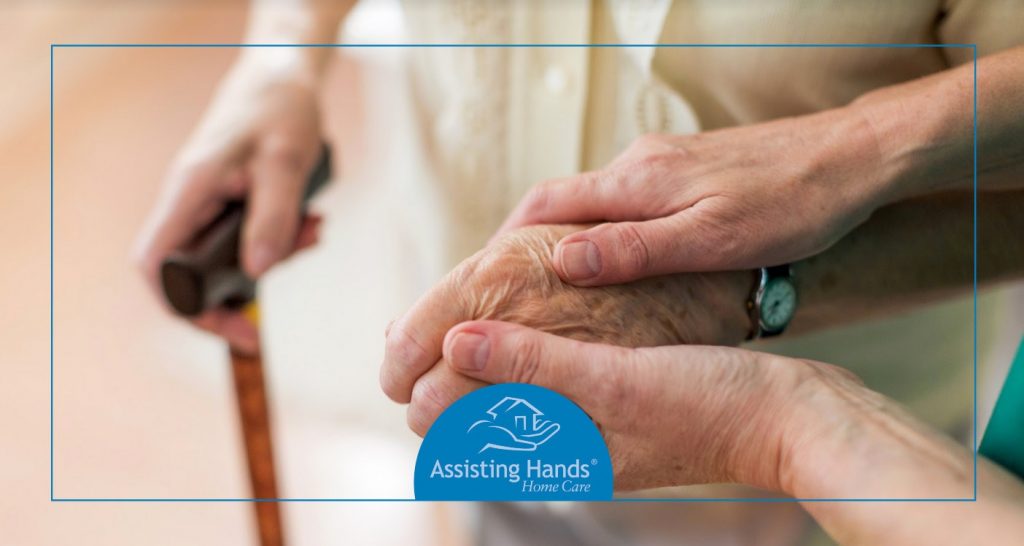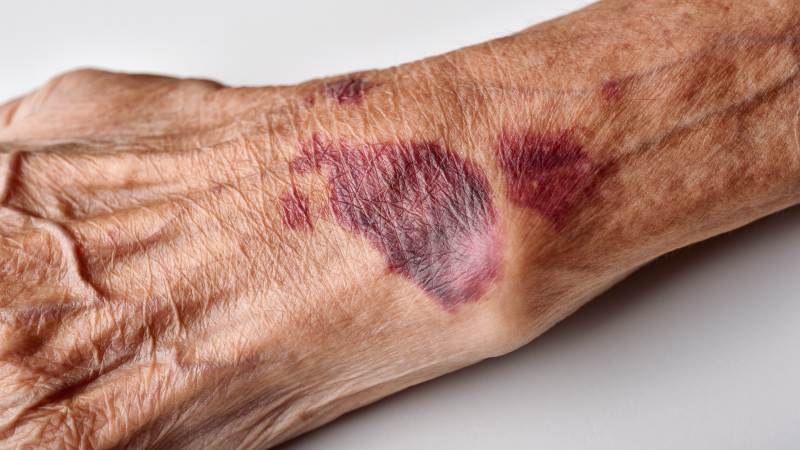

Thinning skin occurs naturally with age—making bruising a common incident among seniors. Most bruising is not a medical concern and goes away within 2 to 4 weeks. Still, it alleviates some concern when caregivers are aware of the potential causes of bruising in their elderly care recipients.
How do bruises occur?
An injury can cause capillaries, which are small blood vessels, near the skin’s surface to break. When the injury occurs on a part of the body, such as an arm or a leg, blood leaks out of these vessels. A dark mark, or bruise, results. The bruise disappears once the body reabsorbs the blood.
Most often, the harder the injury, the larger the bruise. In elderly individuals who bruise easily, however, even a minor bump can cause a bruise. Bumping a leg into a side table, for instance, can lead to the senior developing a substantial bruise.
What causes bruising in seniors?
1. Thinner Skin
Thinner skin is an outcome of aging. Due to their thinner skin, older adults are more prone to experiencing bruises. Skin becomes less flexible and thinner in seniors because of a lack of fat under the skin. Without a protective, cushiony layer of fat, blood vessels break more easily.

2. Gender
Older women tend to bruise more readily than older men. This is due in part to the fact that women’s and men’s skin age differently; hormonal differences play a large role. As a result, bruising is not the same between genders, neither is healing from a bruise.
3. Medications and Supplements
The body’s ability to clot decreases with the use of certain medications. These drugs include aspirin, ibuprofen, and naproxen sodium. Anticoagulant medications, such as warfarin, heparin, and apixaban, can also lead to significant bruising in the seniors who take them.
Certain antibiotics and antidepressants can also be responsible for clotting issues. Bleeding from damage to small blood vessels at the skin’s surface takes a longer time to stop as a result of clotting problems. As enough blood leaks out, a bruise develops.
Corticosteroids can contribute to bruising by thinning the skin. Topical and systemic corticosteroids may be prescribed to seniors for health issues, such as eczema, asthma, and allergies. Dietary supplements, like ginkgo balboa, have a blood-thinning effect, thereby increasing the risk of bruises.
4. Diseases
Unexplained bruising in the elderly may be caused by any of various medical conditions. Clotting disorders, such as hemophilia, thrombocytopenia, and Willebrand disease, can cause seniors to develop bruises more often. Several other diseases can also cause clotting and consequent bruising.
Diseases that affect clotting include chronic inflammatory disease, such as lupus. Cirrhosis and other liver diseases that impact clotting may be behind instances of bruising in seniors. Hodgkin lymphoma, leukemia, and multiple myeloma are cancers that affect clotting and cause bruising.
5. Vitamin Deficiencies
Seniors are at risk for malnutrition due to decreased appetite, limited mobility, poor dental health, trouble chewing, or changes to their access to healthy food. Deficiencies in important vitamins, like vitamin B12, C, K, or folate, can make older adults more susceptible to bruising.
6. Elder Abuse
Elder mistreatment can also be a cause of unexplained bruising. Most commonly in the cases of elder abuse, the bruises are large (greater than 5 cm) and located on the face, arm, or torso. It’s critical for families to ask about the bruises to determine if physical abuse occurred.
7. Falls

Older adults have a high fall risk due to decreased balance, poor vision, and tripping hazards in the home. Falls can lead to significant injuries, such as broken bones and head injuries. But seniors who fall can also develop bruises.
8. Dementia
Dementia is a progressive brain condition that can lead to changes in the senior’s behavior. Due to behavior changes, an elderly individual can accidentally injure themselves, leading to a bruise. When asked about any altercations, the dementia patient may not remember, making observation necessary.
How do bruises heal?
Once a bruise forms, caregivers can do little to speed up its healing. Bruises disappear on their own as the body absorbs the blood. However, healing may take longer in older people. Caregivers can try elevating the bruised area and applying an ice pack.
How do caregivers prevent bruising?
If a senior takes medications that cause dizziness, discuss the issue with the physician or pharmacist. Serve nutritious meals to ensure the older care recipient consumes enough vitamins and minerals. Eliminate fall risks by removing clutter, cords, and throw rugs from walking paths.
Install ample lighting in the home to prevent falls and injuries. Schedule routine eye and hearing exams for the senior to ensure their eyesight and hearing are in good condition. Hire professional caregivers from Assisting Hands Home Care who take proactive safety measures to prevent bruising.
We are a reputable home care agency providing exceptional in-home elder care. Our caregivers are tasked with a comprehensive range of non-medical care services to keep aging care recipients physically, emotionally, and socially healthy as they age in the comfort of their own homes.

Caregivers prepare healthy meals to ensure seniors eat healthy. We perform routine fall-risk assessments and remove clutter or other fall hazards from the home. If the senior lives with a medical condition, we provide safe transportation and escort to doctors’ offices and medical clinics.
Responsibilities include light housekeeping, medication reminders, and grocery shopping. We provide assistance with personal hygiene routines, such as bathing, dressing, and toileting. Our caregivers are pleasant companions who stimulate seniors with games, conversations, and outings. Companion care prevents loneliness and isolation.
Aging in place safely and comfortably calls for extra help at home. Assisting Hands Home Care provides the necessary in-home support to give aging individuals the opportunity to remain in a familiar home setting near family, friends, and their community.
When your aging loved one is ready for quality senior home care, choose Assisting Hands Home Care. We are privileged to serve the elderly living in Fort Worth, Texas, and the surrounding communities. Schedule a free in-home consult and we’ll customize the ideal care plan to meet care needs.
